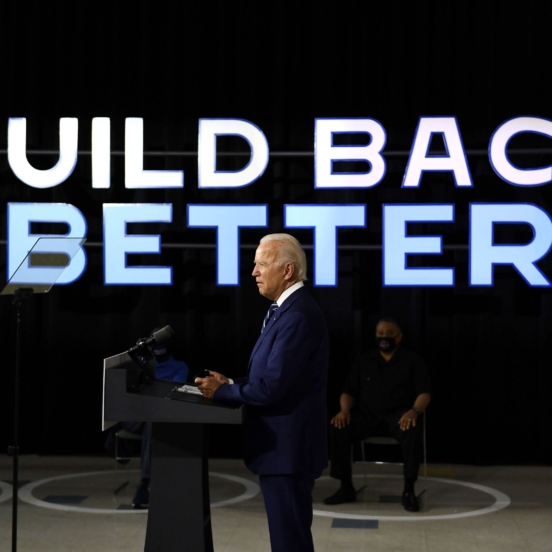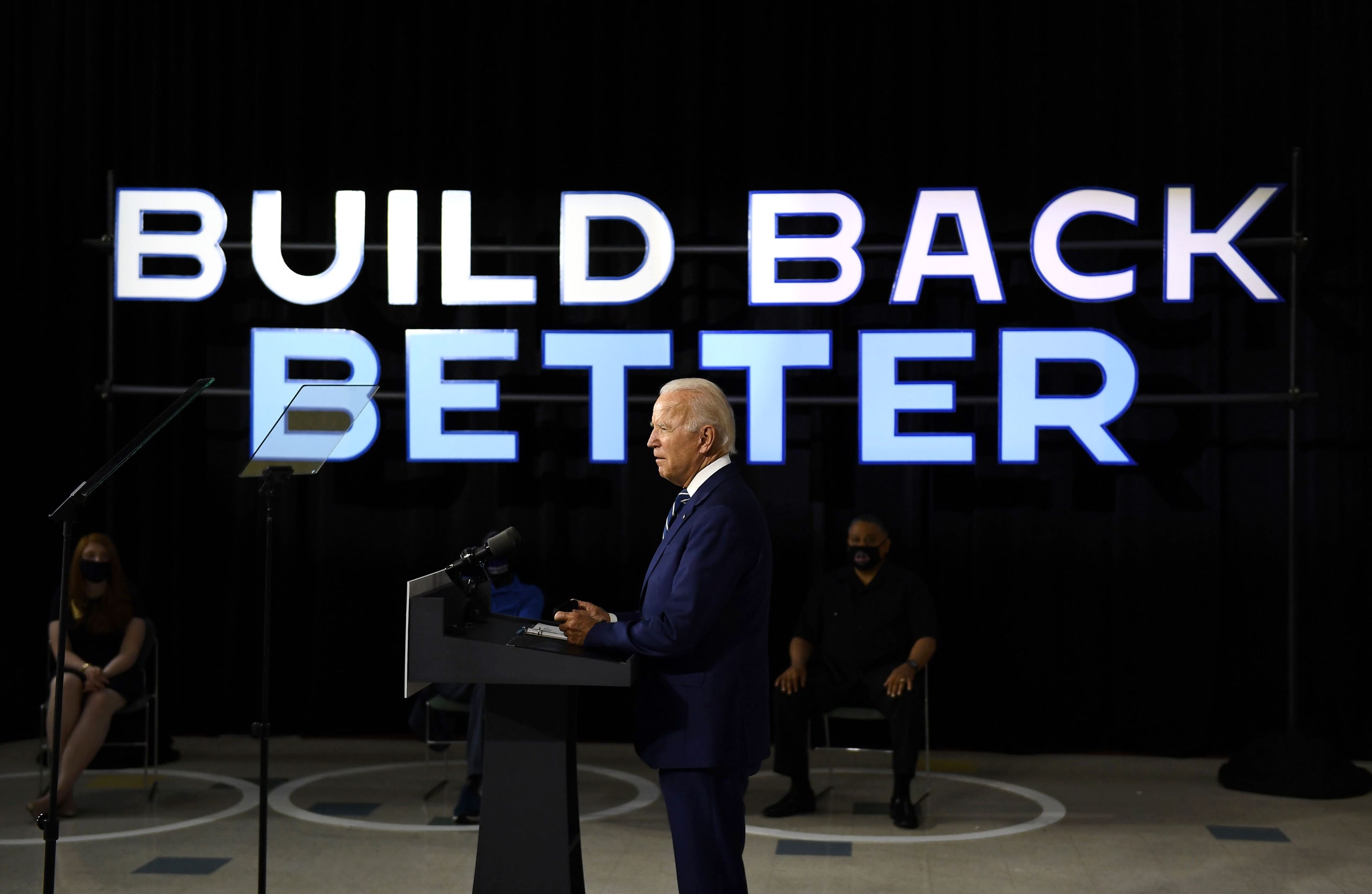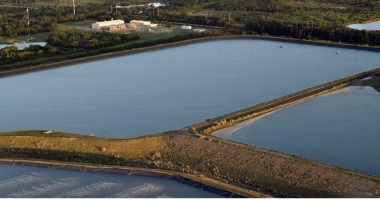Climate, Health and Equity Brief
Mounting threats, climate costs, and a new chapter begins
January 15, 2021

The Climate, Health & Equity Brief is GMMB’s take on the week’s news on the current impacts of climate change. If you haven’t subscribed yet, you can do so by clicking here.
Hot Topic: Ready for battle. As President-elect Joe Biden prepares to take office on Wednesday, several major U.S. and international crises already await him. Each day, U.S. COVID-19 infections and deaths reach horrifying new milestones. Small businesses in cities large and small are struggling to survive. Tens of millions of Americans are in dire financial straits, facing unemployment, eviction and food insecurity. And the nation is more ideologically divided than ever, with formidable threats to our democracy both at home and abroad. Unfortunately, climate change is no exception amid the chaos.
Last year’s #DumpsterFire meme has been particularly fitting, with 2020 emerging as one of the two hottest years ever recorded on planet Earth. Scientists now warn that without immediate action, planetary warming could surpass the alarming 1.5°C tipping point within just ten years, causing severe impacts on human and natural life. Here in the U.S., the Southwest faces a “forever drought” due to persistently low rainfall. More extreme storms slammed our shores in 2020 than at any time in recorded history. And wildfire smoke now accounts for half of all fine-particle pollution in the Western states, effectively wiping out a decade of progress on air pollution.
The climate crisis also has a steep price tag. Researchers attributed nearly one-third of the $199 billion in 1998-2017 U.S. flood damages to climatechange, and a UN report warns that the tens of billions of dollars in global, weather-related economic losses will only increase unless governments move immediately to curb emissions and implement climate resilience projects.
Despite these facts, there is reason for hope. This week, leaders from 50 countries vowed to more than double Earth’s formally protected land and sea from 13 to 30 percent. The World Bank announced plans to invest $5 billion over the next five years to fund climate-resilient projects across Africa. And with next week’s inauguration of Joe Biden, the White House is set to become the new “center of gravity” in the climate fight, where the hard work of reversing years of environmental destruction wrought by the Trump Administration will soon begin.
Here at the Brief, we are beyond grateful to begin this new chapter—and thankful that here in the U.S., progress on climate change will no longer be stymied by those who have treated our natural world with contempt.
—Matt & Traci, GMMB
Health
A recent study found that wildfire smoke now accounts for half of all fine-particle pollution in the Western U.S. and that lung-damaging pollutants attributable to wildfires nearly doubled between 2006 and 2018. (Los Angeles Times)
The U.S. Southwest is bracing for another devastating wildfire season and widespread disruptions to agricultural production after new data found that below-average rainfall due to climate change has set a “forever drought” into motion. (Axios)
After announcing that 2020 is on par with 2016 as the hottest year on record, scientists warn that planetary temperatures could surpass the critical 1.5°C warming threshold as soon as later this decade without an immediate cut in global emissions. (The Washington Post)
Equity
The World Bank announced an investment of $5 billion over the next five years to fund climate-resilient infrastructure, landscape restoration and renewable energy projects across 11 African countries. (Reuters)
A recent analysis found that while more than 9,000 subsidized housing properties in the U.S. sit within one mile of a hazardous Superfund site, the federal government has done little to nothing to address or disclose potential health threats to residents. (The Intercept)
In an open letter, U.S. frontline healthcare workers call on the incoming Biden administration to address environmental racism that leaves communities of color at greater risk of COVID-19 and other public health threats. (The Hill)
Nearly two dozen native tribes and environmental organizations are calling on President-elect Biden to restore protections against logging and industrial development in Alaska’s Tongass forest, a major carbon sink and home to ancestral tribal lands. (Grist)
Politics & Economy
A new study revealed that climate change is exacerbating the cost of flooding in the U.S., with $75 billion—or more than one-third—of the total flood damages between 1998 and 2017 attributable to extreme rainfall. (San Francisco Chronicle)
A new UN report warns that government leaders must significantly increase funding and implementation of climate adaptation measures to avoid major economic losses due to intensifying extreme weather. (CNBC)
A growing number of oil and gas companies are suspending political donationsor reevaluating criteria for candidate support following last week’s violence at the U.S. Capitol. (The Washington Post)
A new analysis found that fossil fuel companies have stockpiled enough drilling permits approved by the Trump administration to continue pumping oil for years to come, potentially undermining efforts by the incoming Biden administration to cut U.S. emissions. (AP News)
The Trump administration EPA has finalized a last-minute rule that restricts future limits on greenhouse gas emissions to power plants, easing oversight on other major polluters like the oil and gas industry and iron and steel manufacturers. (Politico)
Action
Following the UN One Planet summit this week, at least 50 countries formally committed to protecting 30 percent of the planet’s land and sea over the next decade to prevent biodiversity loss and avoid the future emergence of zoonotic diseases. (PBS Newshour)
Science Moms, a newly launched $10 million initiative of the Potential Energy coalition, will work to educate mothers on the threats of climate change and empower them to take meaningful climate action. (The Washington Post)
The Des Moines City Council unanimously approved a first-in-the-nation goal to run solely on renewable energy by 2035, aligning the city with President-elect Biden’s goal to eliminate emissions from the U.S. power sector by the same year. (E&E News)
Kicker

)





